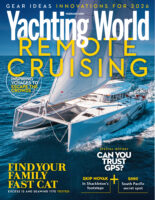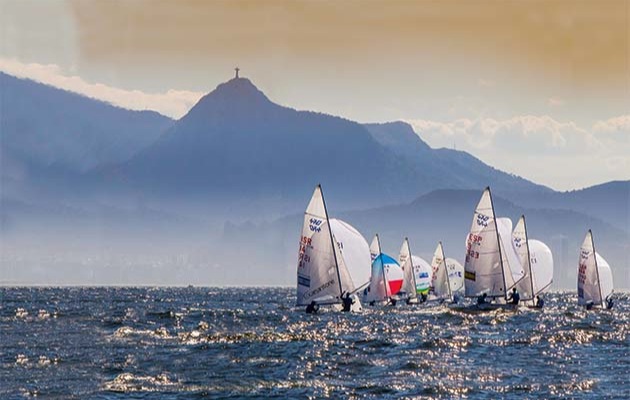From the pressure of going for Gold to the delight of a wildcard entry, every sailor competing at Rio has a tale of joy, sacrifice, and sheer hard work. Helen Fretter looks at who’s who in the Olympic classes
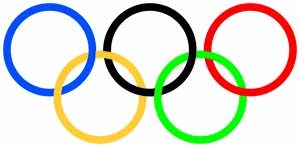 Pollution, Zika epidemic, Brazil’s president impeached, athletes robbed at gunpoint – the preparations for the Olympic Games in Rio have been marred by controversy.
Pollution, Zika epidemic, Brazil’s president impeached, athletes robbed at gunpoint – the preparations for the Olympic Games in Rio have been marred by controversy.
Part of the challenge for the 380 athletes taking to the water from 8-19 August will be to put the negative commentary behind them and to focus on the holy grail of an Olympic medal.
There is no question that Rio has the potential to produce a stunning Games. It is a city of sporting fanatics, famed for its vibrancy as much as for its dark underbelly and vast poverty.
Read Skip Novak’s view about pollution in Rio
The sailing areas include three open-water courses off the famous Copacabana Beach and four inside Guanabara Bay, with Sugar Loaf mountain and the iconic Christ the Redeemer statue rising behind. Brazil has a strong Olympic sailing track record, so fans should be out in vocal force.

Rio’s topography provides more than a picturesque backdrop, however. Sailors need to get to grips with a hugely variable set of conditions. Rio in August may provide everything from strong winds to zephyr-light breezes, sea breezes and thermals or gradient winds, and the unique effects created by the city and surrounding mountains.
RS:X sailor Nick Dempsey says: “It will make the sport look amazing, but it’s shifty, tidal, very unstable and really unpredictable; some days you’re out there just spinning around.”
Reigning Olympic 470 Gold medallist Polly Powrie is looking forward to the challenge. “We’d never really sailed in a place that had so many contrasts before, so for us it’s quite exciting. Inside and outside the harbour throws up quite different aspects, so I think it will be who can hold it all together!”
It’s clear the Rio Games are going to be as much of a mental challenge as a physical one. British 470 helmsman Luke Patience says the venue will suit some sailors’ temperaments more than others. “I quite enjoy a changeable atmosphere. I enjoy quick prioritisation kind of sailing, and the odd curveball. I’m quite stimulated by it. It’s a very rewarding week when you get all sorts and you get it right.
“I don’t know if I’ll get it right every time – but we will get all sorts in Rio!”
Follow our Olympic coverage HERE

See what one long-term cruiser thought of Rio as a cruising destination
Class by class
470
This double-handed dinghy is not the fastest, nor the flashiest, of the Olympic classes, but in Rio it should provide some of the most intense competition of the regatta in the men’s and women’s fleets. Many sailors who stood on the podium in Weymouth in 2012 will be back, but they’ve got older, and wiser, since.
“We’ve both grown up a lot!” comments Polly Powrie who, with Jo Aleh, won at their first Games last time. “I think we’ve had almost eight years of shared experience now, so we know each other very well. Those shared experiences have allowed us to delve a lot deeper, and we probably have a bit more of a professional approach.”
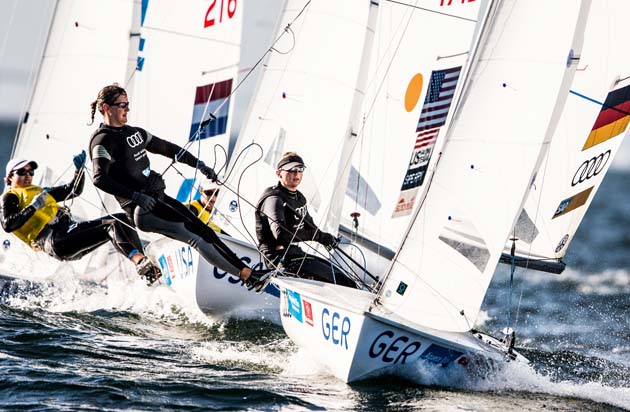
For Powrie and Aleh (NZL) the tough question was how to improve on Gold. “Being high-performing athletes you always feel that there are elements of your performance you can improve. We needed to find the challenge of this Olympic cycle. We were still relatively new to the 470, so there were areas where we could strip it right back and find that there was lots to improve on.”
Britain’s Hannah Mills and Saskia Clark took Silver in London. They too have re-evaluated their campaign over the past four years. “It feels hugely different,” comments Clark. “So much has changed, how we do things, the team we were then. We had such a short time to make things happen for London, whereas this cycle we’ve had a lot more time just to think about it all, strip it all back and rebuild it all up.”
The biggest changes, Mills says, have been in their communication, “We didn’t have time to really anaylse it for London. But we’ve made some big changes in how we communicate, the information we pass back and forth between roles, it’s just made us much more consistent sailors.”
Both teams are expecting the medal hunt to be close. Powrie says: “Everyone’s had their moments, so we have a bunch of five or six of us floating around the top of different regattas. From what we’ve learned in Rio already we’ve seen the top tier come through.”
In the men’s fleet, meanwhile, reigning Gold medallist Mathew Belcher returns, this time sailing with Will Ryan. GBR Silver medallist Luke Patience also returns with a new crew, but his road to Rio has been more challenging than most.

After his 2012 crew Stuart Bithell opted to move to helming, Patience began his Rio campaign with Joe Glanfield. When Glanfield decided to step back to coaching, Patience began sailing with Elliot Willis. “Elliot was diagnosed with bowel cancer and here I am on crew No 3,” explains Patience, who is now selected with Chris Grube.
“We’ve had to try to fast track our four-year programme into eight months. Our mentality is very much: we don’t have until day one of the Olympics, we have until the last race of the Olympics to learn.
“I will run out of days, that’s a fact. I won’t be able to finish some things I want to. But that doesn’t mean I can’t be on the startline. Somebody has to win the sailboat race, and I don’t see why it can’t be me?”
Patience’s joy at winning a medal at his home Games shone through last time around. “Stuart and I just had a ball. Win or lose we always made sure we were having fun. Some people took that as a bit of arrogance. We said: “We’re here to win!’’ Of course we were. What the hell else were we there to do? But it wasn’t us saying we were better than everyone. It was our way of saying, we’re not here for a joke, we’re not afraid to say that winning is the goal.
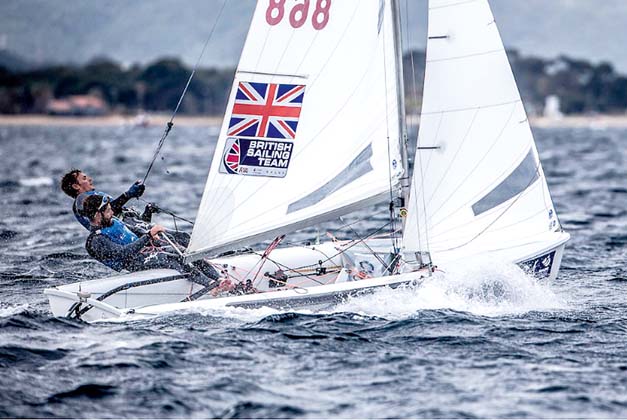
Patience and Grube have fast-tracked their Olympic campaign to just eight months
“I have tried to carry that through to this cycle. Naturally I’ve grown up a bit, so I’ve probably become a bit less of an excitable child! But it’s been a difficult four years.
“The most important thing here is not my mentality. It’s that Elliot becomes healthy and happy and is still walking the Earth. But on the sporting side of things, wow, what a shock the past three and half years have been. I honestly thought after London, Silver medal, here we go! How wrong was I?
“One thing that has never faltered is my passion for the Olympic Games, my passion for the sport of sailing and the challenge that provides every time we launch the boat. After everything that happened with Elliot, the thing that drove me forwards, was that I’m going to make damn sure I’m proud of whatever I did in these remaining eight months, as well as carrying on what Elliot and I started together.”
Skiffs – 49er/49erFX
In the men’s 49er class it looks set to be a clash of the titans, with 2012’s Olympic Gold medallists Nathan Outteridge and Iain Jensen (AUS) defending their title from the onslaught of New Zealand pairing Peter Burling and Blair Tuke, who took Silver last time.

The barefoot-sailing Kiwis
The barefoot-sailing Kiwis have dominated this Olympic cycle, winning every event they have competed in bar one over the past two years, including back-to-back world championships and Rio test events. The duo are barely out of each other’s sight, also travelling the world together as key members of Emirates Team New Zealand. Outteridge looks ready for a fight back, however, beating Burling to win the last 49er event before the Games.
Other teams to watch include Austrians Nico Delle-Karth and Nikolas Resc. Team GBR’s Dylan Fletcher and Alain Sign have had a strong final year of preparation, taking Bronze at the world championships.
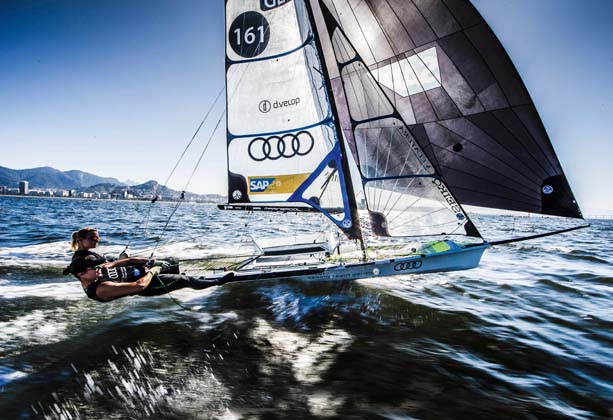
Rio is the first Games to have a women’s skiff class, the 49erFX. This is bound to be one of the more open classes, but if the top-ranked team wins, expect the crowds to go wild. Brazilian Martine Soffiatti Grael and crew Kahena Kunze are competing at their first Games as home favourites, having won both Rio test events and the worlds. Grael is the daughter of national hero and five-times Olympic sailing medallist Torben Grael, and a poster girl of the city.
British hopes lie with Charlotte Dobson and Sophie Ainsworth, who have been scoring consistent top ten places.
Finn
To be a four-time world champion and never once be selected for the Games is almost unheard of in any sport. Yet such has been the fate of Giles Scott, thanks to two factors: the one nation, one boat rule – which allows each country only a single entry in each class – and the dominance of Sir Ben Ainslie, who took Britain’s Finn slot and Gold at the past three Games.
Since 2012, besides winning back-to-back world championships, Scott has also won the two test events in Rio. Is it strange to be a ‘rookie’, finally?
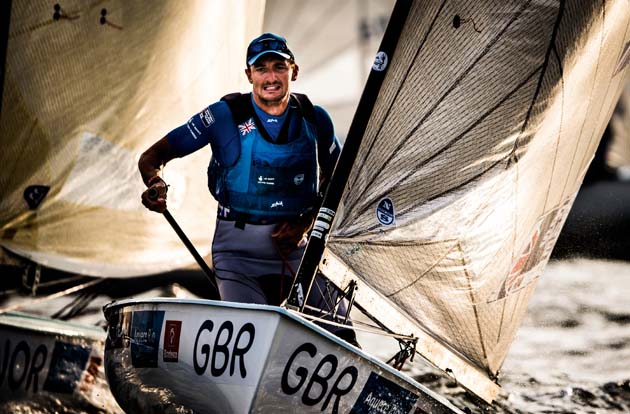
“Getting to the Games is hard,” says Scott, “particularly from such a strong nation as Britain. I’m certainly apprehensive about getting underway, but I wouldn’t say it’s intimidating.”
Talking of Scott’s achievements it is hard not to mention his rival – and now boss – Ainslie. It is a mark of both men’s characters that Scott was one of the first signings to Ainslie’s America’s Cup campaign. Does Scott feel a pressure of expectation? “Yes, and that builds and builds the better you do. For me it’s quite a good thing, it keeps me honest, keeps me working hard, and certainly stops me being lazy.”
But 2016 in Rio is Scott’s moment, and he has prioritised his Olympic campaign over any Cup team commitments – a balance he says has been remarkably easy. Despite the lucrative lure of a future in the Cup, he says he never considered not going to Rio, not even for health reasons.
His only concerns about the water quality are how it might affect his performance over ten days in August. “It is an issue, the water is filthy at times, but the biggest worry is just picking up rubbish when we’re racing, or getting ill and not being able to go racing.”
Scott is likely to face his closest competition from France’s Jonathan Lobert, who finished 2nd to him at both Olympic test events, and took Bronze in 2012, while Ainslie’s near-nemesis, Jonas Hogh-Christensen of Denmark, came 2nd to Scott at the last Finn World Cup.
Solo one-designs – Laser/Laser Radial
With its vast global pool of sailors, the Laser world championships are among the most competitive of all. Unusually, British sailors currently hold the title in both the men’s Laser and women’s Laser Radial classes, with Nick Thompson winning back-to-back championships in 2015 and 2016, and Alison Young taking this year’s Radial contest.
However, champion status does not bring any Olympic guarantees. Thompson faces a true giant of Brazilian Olympic sailing, with previous double Gold Laser medallist Robert Scheidt returning to the class after nearly a decade in the Stars. Scheidt has made it clear that Gold at home is his goal, and few would bet against the 43-year-old.

Brazilian Robert Scheidt will be aiming for an unprecedented sixth Olympic medal
In the women’s fleet the most consistent sailors have been Marit Bouwmeester (NED) and Evi Van Acker (BEL), but 2012 Gold medallist Lijia Xu cannot be ruled out. ‘Lily’ made a last-minute decision to come out of retirement to race at Rio.
Xu is no stranger to unconventional preparation plans – she was forced to miss the 2004 Games after a large bone tumour was discovered in her leg, recovered to win a world title then Bronze in 2008, before breaking bones in her hand just months before the 2012 Games. She meditated to prepare for Weymouth even when she couldn’t sail, and went on to win Gold.
The Laser Radial fleet is also home to one of the true ‘wildcard’ entries of the Games. Four Tripartite places were available to sailors from countries not widely represented at the Games, and first to be selected was Stephanie Devaux-Lovell from the tiny Caribbean island of Saint Lucia. Devaux-Lovell will likely be one of just three athletes walking under the blue, black and gold flag at the opening ceremony, along with two high jumpers.

It could be a Scheidt double in the Laser fleets, with Gintare Scheidt (Robert’s wife) sailing for Lithuania in the Radial class, having won the 2015 test event in Rio
Ranked 125th in the world, the 21-year-old says she grew up sailing Oppies and Laser 4.7s for fun, before getting a wildcard entry to the Youth Olympics aged 14, which she describes as: “By far the best experience of my life, it was mind-blowing.”
She returned with the single-minded goal of going to the full Games.
Without a huge network of sailors to race against – Devaux-Lovell estimates there are around seven Lasers on the island of Saint Lucia – she has relied on travelling to gain race experience, also using Skype to talk to experienced friends and mentors from other countries in the fleet.
She is fizzing with excitement at the prospect of going to Rio, where she has never sailed before.
“I’m just super-stoked. There’s really no pressure on me. I see myself going in as an underdog, but I know I will give it all my best. And we’ll just see what happens, I’ll learn as much as I can and bring it back home.”
Mixed multihull – Nacra 17
For pure spectacle, watch the Nacra 17 racing – the fastest boats at Rio are a new class introduced at this Games, and the only one to be sailed by a mixed man-woman team.

Jason Waterhouse and Lisa Darmanin (AUS)
The new dynamic has thrown up some interesting questions – who helms and who crews being one of the biggest, with most teams opting for a male helmsman and female crew in the lighter winds predicted for Rio. In a big blow, the Nacra 17s have potential to be fearsome, however, with their curved daggerboards and 200ft2 kite.

Matias Bühler and Nathalie Brugger (SUI)
The stand-out team so far has been the French pairing of Billy Besson and Marie Riou, who are the current world champions. Britain stands a good prospect of a medal, though, as Ben Saxton and Nicola Groves are the current European champions.
Windsurfing
Two Olympic classes are devoted to windsurfing, and Britain has some of the most experienced contenders in the men’s and women’s RS:X fleets. Nick Dempsey will be on his fifth Olympics and for Bryony Shaw Rio will be her third Games.
Both have scores to settle – Shaw slipped to 7th in Weymouth and will be looking to assert herself as the current world ranked no 1. Her toughest competition is likely to include Charlotte Picon (FRA), who has mastered Rio’s waters to win both Olympic test events.
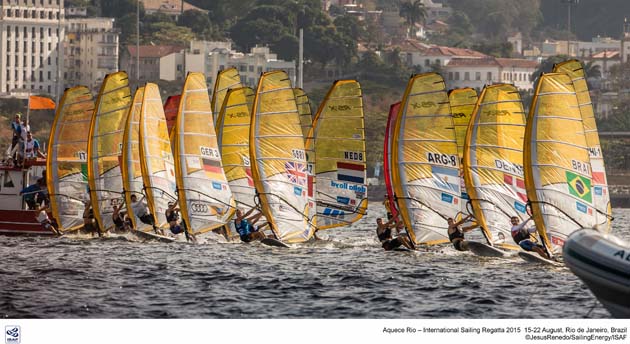
Dempsey took Silver at the home Games, having scored a Bronze and 4th at previous Olympics, so Gold would give him the full set. Dempsey, now 35, says his approach has changed compared with previous Olympics:
“I still get nervous, I still get excited, it’s just all very slightly different. You have a different outlook. Your priorities change a little bit, your perspectives change. I do have the singlemindedness when I need it, but nothing like as much as I did. I enjoy life more.
“I had quite a lot of pressure last time, whereas this time there’s six of us that could all win, so the pressure’s off a little bit. But I’d be very disappointed if I don’t medal. I feel like I’m in a good place, I’m sailing well. I really feel things are falling into place. I’d be pretty gutted if I don’t get a medal. I should.”

